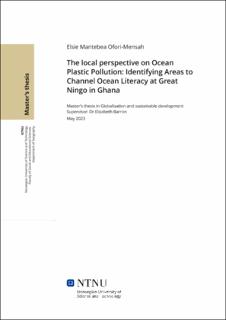| dc.description.abstract | This thesis examines people’s views in old Ningo on ocean plastic pollution and how to eradicate plastic pollution in the coastal environment through local initiatives with sustainable practices. From the data gathered, the study identifies some local agencies and agents that can be helpful to achieve this goal and enhance ocean literacy in the community. Through interviews, a focus group discussion and participant observation, the thesis provides details of how participants of the study understand the term “plastic pollution” in the coastal environment, its effects on the coastal environment and the sources of this pollution including internal causes. It identifies barriers that impede occasional interventions in the area and suggests possible remedies for sustainable outcomes through a collaborative effort of some identified agencies in the community.
By engaging the people of Old Ningo, the study contributes to local people’s involvement in issues that affect their development and bring some global development targets to their doorstep such as ocean sustainability. Through purposive sampling, study participants were selected based on their related connections with the sea. Extensive participation was established through the snowballing approach. Participants for the study included traditional authorities, fisherfolk, residents that stayed close to the beach, Salt miners and workers at recreational resorts along the sea.
Through social constructionism, the people’s knowledge about the sea and coastal environment showed a knowledge construction pattern based on their daily interactions with the sea over a period through which values have been created, normalized, and passed on to many generations. Kollmuss & Agyeman’s Pro-Environmental Behaviour Model explains various habits that contribute to the internal cause of pollution and barriers that limit a drastic change in such negative behaviours.
In the findings, the study realizes the existence of an institutional structure in the community for managing the coastal environment and its resources. However, it identifies elements that impede its function and weaken the traditional authority system, while identifying an inadequate collaboration between the traditional and formal government agencies within the area.
Finally, the thesis presents a list of recommendations to achieve sustainable practices and reduce ocean plastic pollution in Old Ningo and promote ocean literacy in the community among others. Subsequent studies can investigate the experiment of these recommendations against behavioural change in the community particularly in the area of waste management. | |
